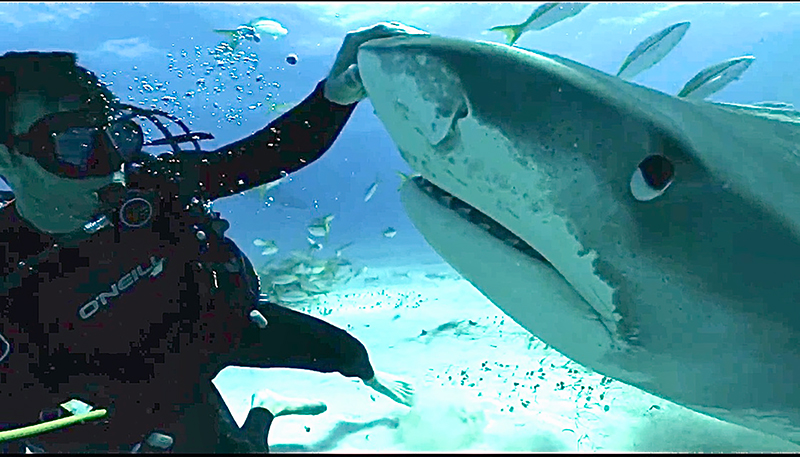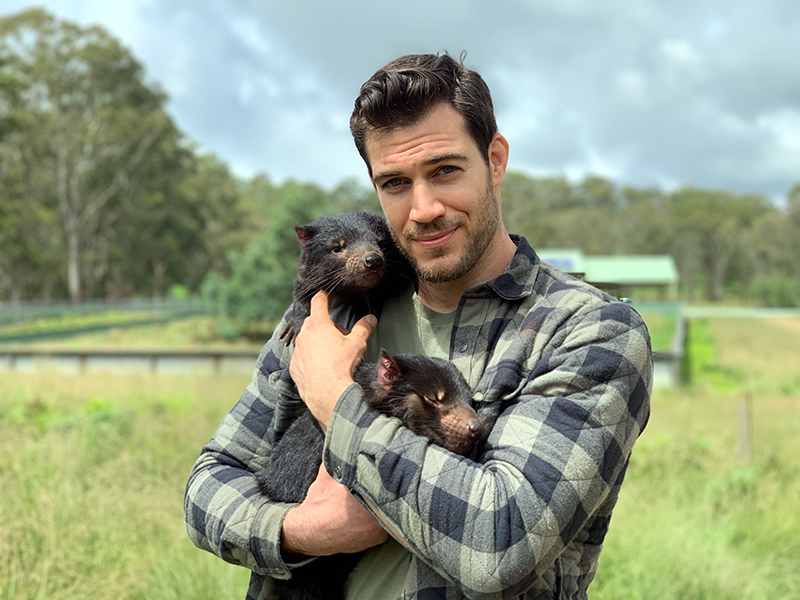The world’s sexiest veterinarian, according to People magazine, and most popular vet on Instagram, with 1.3 million followers, grew up in Overland Park, splashing around a woody backyard creek in search of snakes, lizards, and turtles.
Evan Antin, 38, is an associate veterinarian at Conejo Valley Veterinary Hospital in Thousand Oaks, California, star of Animal Planet’s Evan Goes Wild, and author of World Wild Vet (Henry Holt & Co.). Antin has treated wild animals on six continents and visited 47 countries.
After graduating from Blue Valley North High School, Antin earned a bachelors in evolutionary and ecological biology from University of Colorado Boulder and graduated from veterinary school at Colorado State University.
Antin chatted with IN Kansas City by phone from the Calabasas, California, home he shares with his wife, Nathalie Basha, and the couple’s five adopted cats and a tortoise called “Dodo” who lives in the yard.
Why do you talk to wild animals when you examine them?
It feels less clinical to me and I’m hoping for them too. Instead of some stranger touching them and putting a stethoscope on them, I’m trying to make it just another interaction with someone that’s friendly. I’m also trying to learn about them by looking at them when I’m talking to them.
Do wild animals understand language?
Not the English language, necessarily, although some are trained to, and they do know certain words if they are living in captivity. But they do understand tone of voice. They do understand how your face looks. Body language is an international language, and it crosses over from one species to another.
Have you ever felt threatened by an animal in the wild?
Yeah, I’ve worked with a lot of animals where they are beyond acting defensive, and they are actively striking or trying to bite me. It’s pretty clear what they are saying there. There are very few animals that are just maliciously wanting to hurt—elephants can do that. I absolutely love elephants, but if an elephant is not happy, they might just run you over and be jerks. Hippos can be the same. Buffalo, too.
Not just because they’re scared?
They’re not scared. The big guys don’t have much to be scared about. They are just territorially aggressive for no obvious reason. They don’t want you in their space.
Have you ever encountered an animal in the wild that was trying to interact with you in a friendly way?
Oh sure. Yeah, yeah. Pinnipeds are known for that.
What are pinnipeds?
Seals and sea lions. People call them the dogs of the ocean, and they actually are. A lot of marine mammals evolved from terrestrial wolves and dogs. There are transitional fossils that show in-between species when these wolves were becoming more and more aquatic. You can see their airway migrate to the top of their head. You see appendages becoming more conducive to swimming versus walking. That’s another story, sorry.
No, it’s fascinating, thank you.
Yeah, I remember learning that in undergrad, and I was blown away because it makes so much sense when you look at the behavior. I’ve met wild (seals) where they want to see what you are and what you’re doing, and they’ll swim in circles around you and do somersaults and flips. They’re not trying to take anything from you or get something to eat from you like some other wildlife might do. It’s just a genuine curiosity.
I’ve had that experience with other mammals, and some birds, where they are just curious.
Sometimes you come across wild primates and they are habituated to people, but they live in the wild. In my experience, most of those cases involve some sort of reward that they are seeking—they want you to give them food or they want to take your food.
That’s an interesting distinction.
Matter of fact, one time I was in Tanzania having a lunch picnic at one of the national parks and this big fish eagle just swooped and grabbed half a sandwich right from my hand with its talons. It was light work; it was nothing for him.
On the home front, it seems like dogs understand more than cats. Do they really, or do cats just not care?
In my experience cats have as much ability to understand, but a big difference between dogs and cats is that cats were domesticated in more of a passive manner.
How so?
Dogs for thousands of years have been selectively bred and trained to do certain things: sound alerts and warnings, catch vermin, hunt, pull sleds. Whereas with cats, domestication millennia ago was like, “Hey, let’s get some cats in here as pest control.” We didn’t train them or breed them for other tasks. They’re just phenomenal little hunters.
There are different breeds of cats, but it’s more about selecting for physical features rather than tasks. That’s why their personalities are so different than dogs. Part of the selection process for dogs was: “This dog’s a good dog. It’s not going to bite me or my kids or my friends and it wants to please me.” Whereas cats were initially mostly outdoor, and then indoor-outdoor, and, except when we are feeding them, they are out there living off the land.
Another aspect is that indoor cats are very sociable, and I always recommend people have multiple cats, because cats in most cases like to have someone to groom with and play with. But most wild cats—other than lions—are pretty independent species. Leopards, tigers, and other big cats hunt alone and do most things alone. The mother will take care of the babies for a while, and you might have young males in a group of two, maybe three, but they are just more independent. So, it’s not that cats don’t care—well, some don’t care, that’s pretty evident. (Laughs) But there are reasons for it.
If I talk to my cats, they know my tone. If I’ve got food on my coffee table and I’m eating and watching TV and I step away, I can say, “Willie, don’t do it.” He’ll be looking at my food, and he knows exactly what I’m talking about, and he won’t do it. He 100 percent knows.
A big part of being a vet is communication with animals in that way, using tone and body language and listening and reading their body language: What are they feeling? What are they showing me in terms of how I can approach them?

I saw on your Instagram that you were recently scuba diving with tiger sharks in the Bahamas. Was that for work or play?
That was for play. I was with a conservation organization, so I want to promote shark conservation and raise awareness about the importance of sharks in our oceans, and why we don’t want to overfish them. But it was also for selfish reasons. Those are some of my favorite animal interactions on the whole planet. That’s very, very special to me to get to do that with them.
I grew up swimming in the ocean and it cracks me up how scared Midwesterners are of sharks.
It’s a lot of ignorance. And not just here. Even on the coast and in other parts of the world, there’s a serious fear of sharks. And, I mean, every once in a while, you see a gnarly shark attack. There was one recently in the Red Sea. I think that was a tiger shark.
Tigers are often listed as the second so-called deadliest shark after great whites, but without quantifying the actual risk.
It’s very slim. If you just look at raw statistics, here’s one that’s horrifying and sad and crazy but true: More people get bit by humans in New York City each year than get bit by sharks in the whole US. [Sources: New York City Health Department statistics reported by AP; International Shark Attack File] Dogs kill around 160 people a year give or take, and sharks kill about six people a year.
Statistically you are way more likely to get into an adverse event when you get behind the wheel than when you get into the ocean.
We’re not one of sharks’ food groups.
No, we’re not. And it’s obvious when you’re diving, when you get under them, they get a better look at you, they recognize you are foreign, you are not on their menu. It’s very rare that fully submerged people get bit. People that get bit are usually feeding sharks, so they are putting themselves at risk.
If people who are just innocently enjoying the ocean get bit, it’s usually because they are splashing around on the surface with a boogie board or a surfboard and the shark thinks, “What is this?” And even then, it’s only a bold few that are going to go make a move and take a bite to see what it is.
I wouldn’t just go try to swim with any tiger sharks around the world. At this spot in the Bahamas, these sharks are quite habituated to divers. It’s the number one spot in the world for diving with tiger sharks.
‘‘Especially outside the US, laws regarding wildlife can be not in the animals’ favor. Ninety-nine percent of the time when a company is offering interaction with wild animals, it’s not a good thing for the animals.”
What are some dos and don’ts you would give vacationers for booking interactions with wild animals?
Especially outside the US, laws regarding wildlife can be not in the animals’ favor. Ninety-nine percent of the time when a company is offering interaction with wild animals, it’s not a good thing for the animals.
If you go somewhere and they say, “Hey, you can have an elephant paint you something,” or “You can take a picture with a monkey,” those are not good things. Usually those are animals that are captured from the wild and exploited. And the sad thing is, the people that pay for these experiences probably have a heart for animals and have no idea that they are funding an industry that is not a good one.
The best way to see truly wild animals is in their native habitat. So go to a protected reserve or national park. Yeah, you’re not going to get to see them as close, and you’re not going to be able to touch them or pet them. But for the animals, that’s the healthiest and best way to see them.
Do you still consider Kansas City home?
I do! Every time I go back to Kansas, I tell people I’m going back home.
How often do you get back and what do you like to do when you’re here?
I’m still just an adult version of who I was as a 4-year-old kid. I still love going to the creek. My mom lives in Leawood now and there are creeks running through that neighborhood. And sometimes I’ll take a little drive and go back to the creeks I played in when I was a kid and look for snakes and turtles or whatever’s in there. That’s always super, super fun. I love the wildlife in Kansas in summer.
I love going to Jack Stack [Barbecue]. That’s been one of my favorites my whole life. The last time back I took my wife there. It was her first time, and she still talks about it all the time. It’s impossible to recreate it here. I bought a bunch of the sauces, but there’s no way to recreate it.
I’ve also gotten really into woodworking lately, and my dad has been woodworking for a little over ten years. He has a totally unrelated profession, but he does commissions and special pieces on the side. I love getting in his shop and playing with him.
Is it tricky balancing a globetrotting career and a marriage?
It could be. I’m very lucky. Nathalie has known from Day One what I wanted to do professionally. We met before I was even in vet school. We were both very passionate about traveling so we would travel together and at least once a year go somewhere exotic. She’s super supportive. She’s super trusting. I’ve been in relationships where this wouldn’t work. She also loves wildlife. I’ve gotten to take her on some of the Africa trips, and those are very special and meaningful for her.
Are there any countries or wild animal experiences left on your bucket list?
Oh my gosh, yeah. There’s like 200 countries and I’ve only been to fewer than 50. Some of the high ones on my list are in sub-Saharan Africa. I’ve never been to Mozambique. I’ve never been to Namibia. I’m talking to a friend about going and spending some time in Gabon and possibly Côte d’Ivoire. I’ve never been to India! India would be super cool.
I love crocodilians and there’s a couple of crocodile species I’ve never seen. There are pygmy hippos I would love to see. They live in dense jungle forests of west Africa. It would be cool to see lemurs in the wild and other weird primates. I’d love to go to Madagascar for that. I’ve never seen tigers in the wild. That would be really, really special.
If you could be reincarnated as a wild animal, which one would you choose?
You can’t help but think how cool it would be to be a big bird of prey. Just soaring on the heat currents up in the sky and seeing the land from above like that would be cool.
Being a dolphin would be pretty cool, too. They are highly intelligent, highly sociable, they don’t have too much to be afraid of in the open water. And they are one of the few animals that don’t just have a specific breeding season where they breed based on when is the best time to have offspring. They are sexually active for fun, too, so that’s more relatable to humans.
Interview condensed and minimally edited for clarity.



